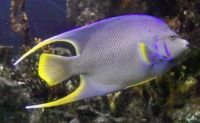Difference between revisions of "Holacanthus bermudensis"
From The Aquarium Wiki
| Line 61: | Line 61: | ||
*{{FishBase |id=3608}} | *{{FishBase |id=3608}} | ||
*[[w:Holacanthus bermudensis|Wikipedia]] | *[[w:Holacanthus bermudensis|Wikipedia]] | ||
| − | *[ | + | *[https://www.liveaquaria.com/product/prod_display.cfm?c=15+2730+402&pcatid=402 Liveaquaria] |
| + | *[https://www.bluezooaquatics.com/productDetail.asp?did=1&pid=170&cid=8 Blue Zoo Aquatics] | ||
| + | *[https://www.bluezooaquatics.com/productDetail.asp?did=1&pid=172&cid=8 Blue Zoo Aquatics] | ||
| + | *[https://www.freshmarine.com/blue-angel.html Fresh Marine] | ||
| + | *[https://www.freshmarine.com/blue-angel-juv.html Fresh Marine] | ||
Revision as of 01:27, 8 March 2018
Blue Angelfish
Holacanthus bermudensis
946 Litres (250 US G.)
40-45 cm (15.7-17.7")
8.1 - 8.4
22.2-25.6°C (72 -78 °F)
8-12 °d
1:1 M:F
10-20 years
Family
Pomacanthidae
| You can contribute to the Aquarium Wiki by expanding this article. Dont be shy!. |
Contents
Additional names
- Blue Angelfish, Bermuda Angelfish
Additional scientific names
- Holacanthus ciliaris bermudensis, Holacanthus isabelita, Angelichthys isabelita
Origin
- Western Atlantic, from Bermuda, Bahamas and off southern Florida, USA to the Gulf of Mexico, including Yucatan, Mexico
Sexing
- Difficult to tell as juveniles. Male adults are somewhat larger then females.
Tank compatibility
- Best housed with tank-mates that are a energetic as this fish
Diet
- It will take most foods including pellets, live and frozen foods.
Feeding regime
- Feed once or twice a day.
Environment Specifics
|
|
This section requires expansion with: Anything the species requires to be comfortable in the tank, such as caves or grasses. |
Behaviour
- Compatible with most peaceful fish of equal size as a juvenile. As it grows, it will become more aggressive and territorial.
Identification
- Large angelfish with elongated dorsal and anal fins. Blue/brown body and the soft parts of dorsal and anal fins and caudal fins with wide yellow margins. The pelvic fins are bright yellow, and the pectorals are blue basally, clear distally, with a broad yellow band separating the two colours.
Note
- This species can hybridise with the Queen Angelfish. Resulting hybrids are called Townsend's Angelfish.
Pictures
External links
- Fishbase (Mirrors:
 )
)
